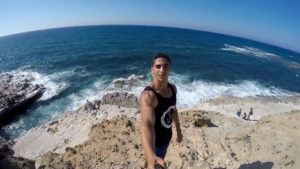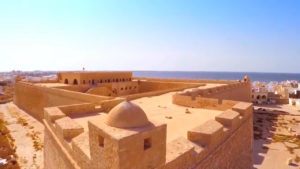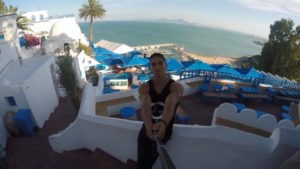By Katie Allie
These are my stories from the road and hard-won guidance from a thoughtful traveler. If I’m making you curious about getting lost and finding the good stuff in this great big world we all share, then I’m doing something right.
When I travel, the friendly West Virginian in me likes to chat. I’ve found that talking to people around the world often surprises me—my initial judgments are constantly being challenged.

Take, for example, my friend Chedi Tanabene, who was 19 when I met him in language classes in Portugal. Initially I didn’t know what to think of him. He is from Tunisia; speaks fluent Arabic, French and English, with Portuguese and Italian not far behind, and works as a personal trainer. He was also nervous to tell me, the American, that he is Muslim. I had never met anyone from Tunisia before, and I barely knew where to find it on a map. I came to discover through my friendship with Chedi that Tunisia is a richly historical North African nation that is relatively liberal with some of the most incredible coastline I’ve ever seen, and the people eat very, very well. Chedi even brought me back tins of harissa to test my spice limits. While we talked, the previously blank borderlines of Tunisia were colored in for me with brilliant hues of aquamarine water, golden sand dunes and the smells of unfamiliar spices. I couldn’t help but think that if more people knew about what a gem Tunisia is, more would want to visit. It is my hope that your interest in Tunisia is piqued, but more importantly I hope you will make an effort to talk to people—especially ones who may have a different vantage point on the world than you. We often have more in common than we may think and wonderfully different ways of looking at things.
Chedi, which is pronounced sheh-dee, is 20 years old and hails from Kelibia, located on Tunisia’s brilliant coastline. He is currently in school in Lisbon, Portugal.
Tell me about your childhood and what it was like growing up in Tunisia.
Chedi: I grew up in a normal family with two sisters—one older, 22, and one younger, 6. I passed my whole childhood on the street with friends playing football [soccer], sometimes with a ball made from papers and clothes after the neighbor ruined the real ball. For fun we stole fruits from neighbors’ trees either to eat or sell so we could play Atari.
In terms of education, before kindergarten, I went to Kotteb, which is a place where we learned and memorized the Quran, but that was more for our parents to get rid of us in the mornings. I went to primary school where I succeeded and then high school in Tunisia where my father helped me discover an interest in sailing. I had normal days: school, training, homework and repeat. I didn’t have weekends because we study from Monday until Saturday. Only on Sundays we rested, so nothing special about weekends.
Imagine for a moment that someone is visiting Tunisia for the first time. Where would you tell them to go? What should they definitely see or eat? Play the role of tour guide.
Chedi: Tunisia is not too big, but it has many things to see. If you are into monuments, I recommend you go to Carthage, Dougga and Utica—ancient cities with impressive Roman ruins. In the center, you can pass by Sbeitla. In  the south, you will find the El Djem Colosseum in Thysdrus—widely considered the most impressive example of Roman ruins in Africa—which was built in the third century. You can also get a nice view in Sidi Bou Said. Try Café des Delices to have a green tea with nuts. The beaches are really cool there, but the ones in my city of Kelibia are the best ones in the country. There is also a very nice beach in Mahdia, as well as in Djerba, which is an island that attracts many tourists.
the south, you will find the El Djem Colosseum in Thysdrus—widely considered the most impressive example of Roman ruins in Africa—which was built in the third century. You can also get a nice view in Sidi Bou Said. Try Café des Delices to have a green tea with nuts. The beaches are really cool there, but the ones in my city of Kelibia are the best ones in the country. There is also a very nice beach in Mahdia, as well as in Djerba, which is an island that attracts many tourists.
Going more to the south, you will end up in the desert of Tunisia. You can take a trip from Douz to Ksar Ghilane with off-road cars and some camel rides. The perfect day would be just hanging out with friends: going to the beautiful beaches, driving around in the city, drinking coffees or smoking shisha and sharing some moments with family.
You can’t go to Tunisia without eating our spicy food. I recommend you try cous cous; ojja, a baked tomato and egg dish often made with merguez sausage; Brik, a thin pastry often filled with an egg and fried; Mloukhiya, a green plant typically made into a sauce or soup, and many other delicious things. When you are in the south, ask for the legmi. It is a drink that comes from the palms.
How have things changed, for better or worse, for Tunisia in the past five to 10 years?
Chedi: In the past six years, we had the Jasmine Revolution,* which started the Arab Spring. Everything changed in the country. We now have more freedom to criticize things, even politicians and the government. Before, you would go directly to prison. In my opinion, this is the only thing that got better in the last years, because for the rest we have only had more corruption from those who hold high offices in the country. The number of jobless is getting higher and higher, and the worst is that we had some attacks from terrorists in Sousse and at the Bardo National Museum in 2015. After this, we lost a lot of tourism. Hotels closed and more people lost their jobs. It got so bad that some wanted the president back because we were in better conditions than now.
*The Jasmine Revolution, or Tunisian Revolution, occurred when popular protests forced out then-President Zine El Abidine Ben Ali in 2011. He had been the president of Tunisia for 23 years, and his ousting is largely credited as the beginning of the Arab Spring movement, the effects of which are still rippling through the world today.
What is something you wish people knew or understood better about your country?
Chedi: The most important thing that I wish people understood is that my country is not very dangerous. It is pretty and has a huge history. Something else is that we are not very Arabic, such as in the Middle East. We are more western in the way we dress and the way we live. We have some restrictions related to culture and some with religion. Families live more united together and close to each other, so living alone when you are 18 years old is not an option. Love and relationships are more private, and you hardly see couples kissing in public.
 What do you like to do in your free time?
What do you like to do in your free time?
Chedi: In my free time, I usually make YouTube videos or do personal training.
What is your favorite food?
Chedi: My favorite food is spicy pasta or anything my mother makes.
What is your favorite TV show?
Chedi: I don’t have a favorite because I don’t watch TV.
Have you ever been to the United States?
Chedi: No, I have never been in the U.S., but I would love to go.
To what countries or places have you traveled?
Chedi: My first destination was Portugal. Then I traveled to Spain, France and Italy.
What is currently your number one goal in life?
Chedi: To be happy.
 About the Author
About the Author
Katie Allie is a West Virginia native who holds degrees in English and elementary education. A teacher by trade, she spent years in a classroom before branching out as a travel consultant and writer. With five continents under her belt and an affinity for noodle soup, it should come as no surprise that she loves to write about food and talk adventure. She may be reached at hello@acrossthelinetravel.com.









One Response
Well written!….very interested in researching these foods…especially the green tea with nuts?….You have an affinity for noodle soup??? Dare I say…I DO TOO!!!!! Crazy huh?..I mean ..I eat more noodle soup than Anthony Bourdain I bet LOL…!
Thank you! Keep up the good work! I like the sentence “While we talked the previously blank border lines of Tunisia………..”